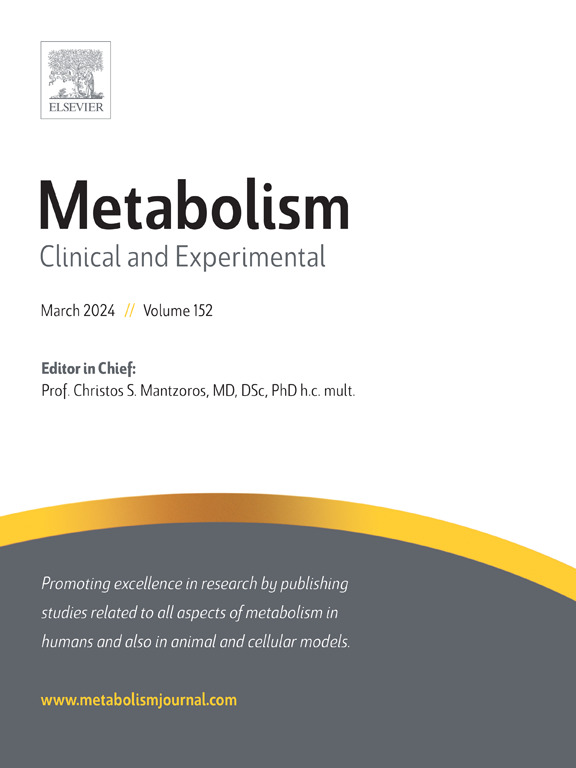PRR14 mediates mechanotransduction and regulates myofiber identity via MEF2C in skeletal muscle
IF 10.8
1区 医学
Q1 ENDOCRINOLOGY & METABOLISM
引用次数: 0
Abstract
Skeletal muscle is a crucial tissue for physical activity and energy metabolism. Muscle atrophy, characterized by the loss of muscle mass and strength, contributes to adverse outcomes among individuals. This study elucidated the involvement of the nuclear lamina component PRR14 in transmitting mechanical signals and mediating the impact of exercise on skeletal muscle. The expression of PRR14 demonstrated a positive correlation with exercise, while a decline in adult skeletal muscle is evident in disuse muscle conditions. Genetically, multiple single nucleotide polymorphisms (SNPs) within PRR14's genomic locus were linked with muscle mass and function. Specific knockout (KO) of skeletal muscle Prr14 in mice lead to muscle atrophy, validating the genetic association. By employing biochemical analysis and high-throughput sequencing techniques, including transcriptome profile and epigenome investigations such as Cleavage Under Targets and Tagmentation sequencing (CUT&Tag-seq) and Transposase-Accessible Chromatin sequencing (ATAC-seq), we discovered that PRR14's deficiency altered chromatin structure, regulated MEF2C's activity, and disrupted myofiber identity maintenance, ultimately causing muscle atrophy. Our finding highlights the crucial role of PRR14 in mechanotransduction and epigenetic regulation, offering new therapeutic avenues for skeletal muscle pathologies related to these mechanisms.

PRR14在骨骼肌中通过MEF2C介导机械转导并调节肌纤维身份。
骨骼肌是身体活动和能量代谢的重要组织。肌肉萎缩,其特征是肌肉质量和力量的损失,有助于个人的不良后果。本研究阐明了核层成分PRR14参与传递机械信号和介导运动对骨骼肌的影响。PRR14的表达与运动呈正相关,而在废用肌肉状态下,成人骨骼肌的下降很明显。遗传上,PRR14基因组位点内的多个单核苷酸多态性(snp)与肌肉质量和功能有关。小鼠骨骼肌Prr14的特异性敲除(KO)导致肌肉萎缩,证实了遗传关联。通过生化分析和高通量测序技术,包括转录组谱和表观基因组研究,如靶下切割和标记测序(CUT&Tag-seq)和转座酶可及染色质测序(ATAC-seq),我们发现PRR14的缺失改变了染色质结构,调节了MEF2C的活性,破坏了肌纤维的身份维持,最终导致肌肉萎缩。我们的发现强调了PRR14在机械转导和表观遗传调控中的关键作用,为与这些机制相关的骨骼肌病变提供了新的治疗途径。
本文章由计算机程序翻译,如有差异,请以英文原文为准。
求助全文
约1分钟内获得全文
求助全文
来源期刊

Metabolism: clinical and experimental
医学-内分泌学与代谢
CiteScore
18.90
自引率
3.10%
发文量
310
审稿时长
16 days
期刊介绍:
Metabolism upholds research excellence by disseminating high-quality original research, reviews, editorials, and commentaries covering all facets of human metabolism.
Consideration for publication in Metabolism extends to studies in humans, animal, and cellular models, with a particular emphasis on work demonstrating strong translational potential.
The journal addresses a range of topics, including:
- Energy Expenditure and Obesity
- Metabolic Syndrome, Prediabetes, and Diabetes
- Nutrition, Exercise, and the Environment
- Genetics and Genomics, Proteomics, and Metabolomics
- Carbohydrate, Lipid, and Protein Metabolism
- Endocrinology and Hypertension
- Mineral and Bone Metabolism
- Cardiovascular Diseases and Malignancies
- Inflammation in metabolism and immunometabolism
 求助内容:
求助内容: 应助结果提醒方式:
应助结果提醒方式:


